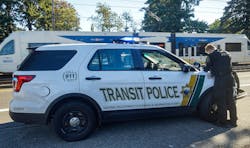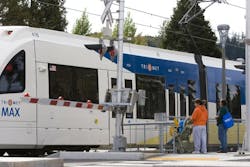TriMet Board of Directors approves continuing and expanding TriMet’s Safety Response Team
TriMet’s Board of Directors has approved continuing and expanding TriMet’s Safety Response Team. The board voted on July 26 to approve a new contract with Portland Patrol Inc., the company that provides members for the Safety Response Team.
TriMet’s Safety Response Team model, first introduced as a pilot in 2021, is one of two industry-leading advances in transit safety and security that led to top honors from the American Public Transportation Association (APTA) in 2023. The Safety Response Team discourages inappropriate and illegal behavior with an emphasis on riders in need, conducting social service outreach and providing referrals for housing and mental health services.
APTA Rail Security Gold Award highlights Safety Response Team, other security initiatives
TriMet has reimagined public safety and security on transit, for which the Safety Response Team plays a critical role. TriMet’s Reimagining Public Safety and Security on Transit efforts began in 2020, following candid conversations around racial injustice. TriMet earmarked nearly $2 million to kick start initiatives to identify agency-wide improvements to safety, security and the customer experience.
By 2023, TriMet’s efforts to reimagine safety and security merged into an approach that emphasizes community-driven security solutions, using teams spread across TriMet’s system. Traditional security and police continue to operate on TriMet, but the agency’s new efforts call for a more holistic approach, where specialized teams act on their strengths, freeing up the Transit Police Division to respond to crimes and major incidents. Among the nearly 33,000 people the Safety Response Team has connected with, 4,582 have been welfare checks and 1,372 have been referrals to social services, including emergency and long-term shelters, addiction and mental health services and immigration and refugee services.
“By taking a holistic approach to public safety on our system, TriMet has dramatically increased our outreach efforts, helping passengers in need across our system while making it more inviting for everyone to get on a bus, MAX or WES train,” said Andrew Wilson, executive director of safety and security for TriMet.
TriMet notes that according to its surveys, safety and security are among the top issues for riders. Through the reimagining process, TriMet gathered feedback from more than 13,000 riders, frontline employees and community members across 14 languages and cultural communities. TriMet also established a blue ribbon panel of local and national experts—its Transit Public Safety Advisory Committee—to advise the agency on national best practices for transit security, equity and community engagement in safety and security. TriMet has grown its roster of security teams over the past three years and adapted to the new challenges facing all metropolitan transit agencies.
TriMet’s reimagined security efforts helped to diversify its security teams, using unarmed, non-police security and TriMet code enforcement personnel in most situations. This has given TriMet more flexibility with staffing and identifying the best teams needed to address incidents on its system.
Camera-aided investigations
APTA honored TriMet with a Rail Security Gold Award not only for its diversified security teams, but also for its camera-aided deployment of personnel. TriMet’s extensive camera network has more than 3,000 cameras on its light-rail system, with roughly half upgraded in the past three years. This improved technology allows for monitoring the system in real time, to verify reported incidents and deploy the appropriate resources for improved outcomes. The security camera network features state-of-the-art cameras that TriMet personnel can remotely control to pan, tilt and zoom.
They also record footage of incidents on or near the system and assisted TriMet's law enforcement partners apprehend suspects in 49 homicide investigations and 57 shooting cases in 2022. They come in addition to new violence reduction strategies that have more efficiently incorporated law enforcement resources.
In 2022, the Multnomah County Sheriff’s Office, which oversees TriMet’s Transit Police Division, developed a violence reduction strategy called the Enhanced Public Safety Initiative. The missions focus on disrupting criminal activity, recovering stolen property and seizing illegal firearms. The missions rely on the Safety Response Team and others for support. Transit Police and partner law enforcement agencies address criminal activity, with the shared goal of making communities safer by getting criminals and illegal firearms off the streets. Among other outcomes, these missions resulted in 93 arrests, 233 warnings, 25 citations and 74 exclusions from TriMet.
“It’s through strong partnerships and collaborative approaches, such as this enhanced initiative, that help us achieve our collective goal of improving safety within our community,” Multnomah County Sheriff Nicole Morrisey O’Donnell said. “I am proud to lead the public safety work of the Sheriff’s Office, alongside TriMet, to support the transit system and make our neighborhoods around them safer and stronger.”
TriMet notes calls for police services dropped in 2022 by 14 percent compared to 2021. The Safety Response Team also increased its presence to handle situations that shouldn’t require police intervention. If they do run across a dangerous situation, they have a direct line to the police, however.
Safer rail crossings
APTA also recognized TriMet’s innovative approach to crossing safety with its Rail Safety Gold Award. APTA recognized TriMet’s ongoing project to increase safety at rail grade crossings using video analytic data to inform a Risk Ranking Tool that will help prioritize crossing improvements. In partnership with the Federal Transit Administration (FTA), the new approach uses deep-learning software to improve the accuracy of data over time and better understand human behavior around TriMet’s tracks.
The project is cataloging pedestrian, motorized and non-motorized vehicle traffic counts, which are then compared with infrastructure, operating environment and reported incident data. TriMet says the goal is to identify and categorize rail crossings, using a Risk Ranking Tool, to prioritize the most effective safety enhancements. The project is scheduled to last through 2025 and was made possible through a cooperative agreement with the FTA.


